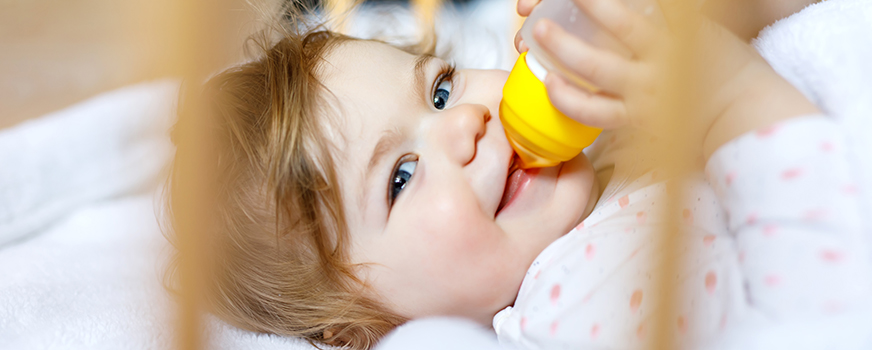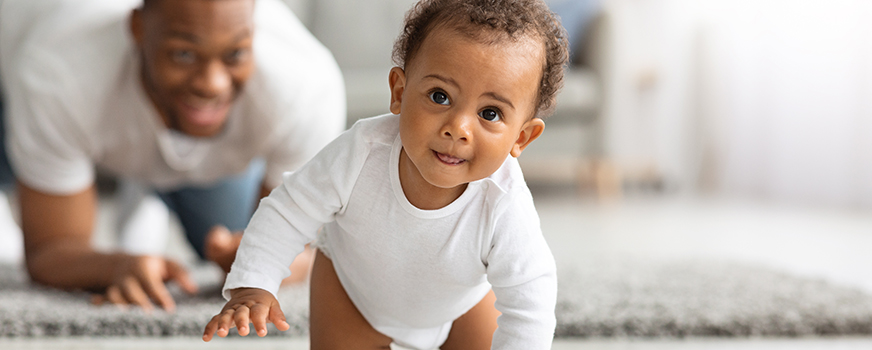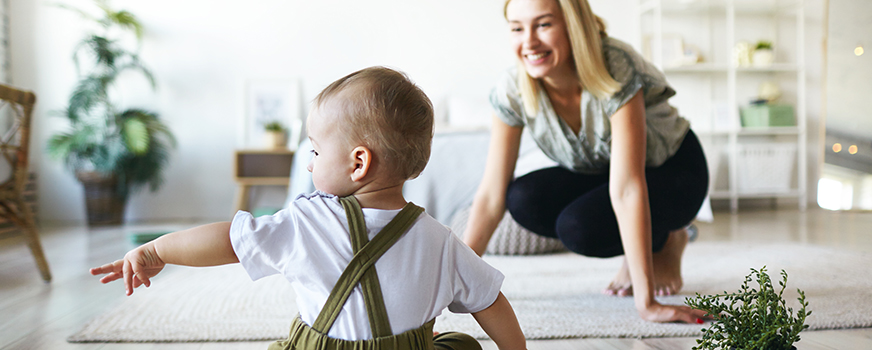The first 12 months of your baby’s life are some of the most exciting moments, and time can feel like it’s moving so fast! It can be easy to get caught up in the moment, but knowing monthly baby milestones to look out for can help you anticipate new development and know what to expect in the incredible first year of your baby’s life. From growth spurts to learning new skills, read on to see what first year baby milestones to expect in your baby’s first 12 months.
Milestones for 1-Month-Olds
For the first month or so, your baby will have very few needs – mainly sleeping, feeding, and cuddling – and there won’t be many first year baby milestones to notice. Most of what they’re able to do is caused by reflexes and they’ve started to focus on objects with both eyes. They’ll start to recognize you as their parents and prefer looking at human faces over other objects.
Milestones for 2-Month-Olds
At around 6 to 8 weeks, you’ll take them for their first check-up, receive their first vaccinations, and have a full health review done by your chosen health professional such as a pediatrician or general practitioner. It’s normal for babies to lose weight right after birth, but they should have gained it back by now.
This is about the time they’ll be discovering their hands, holding them open and grasping for objects more. Fair warning: a two-month-old likely won’t have mastered the art of letting go just yet, so be prepared for hair pulling if they get ahold of your hair or even their own. Their eyes are also starting to sync up and follow each other when looking about the room. You’ll also likely experience their first smile around this time!
Milestones for 3-Month-Olds
Your three-month-old will continue to explore their grasp, reaching for more things as the muscles in their arms and hands develop. They may also start to try and put items in their mouths as well as shake and rattle them around. These muscles may also be used to push up their chest off the ground during tummy time, where they might also start rolling from their front to their back on their own.
Other developments include the closing of the fontanelle (soft sport at the back of the head) and increased sleeping time. If they sleep 5 or 6 hours at a time, this is considered sleeping through the night at this age.
Milestones for 4-Month-Olds
Now’s the time for your baby’s next round of vaccinations and for you to begin preparing your home for a mobile baby. They’ll begin to link their different senses to what they see, such as the family dog and the barking noises they hear. Four-month-olds may also start showing interest in solid foods and putting everything from their hands to whatever’s within reach into their mouth.

Milestones for 5-Month-Olds
Your five-month-old baby’s weight should roughly be double what they weighed at birth. If they’ve begun to show interest in solid foods, now’s the time you can begin experimenting with them. However, don’t be alarmed if they wait a few more months to begin expanding their diet. Either way, breastmilk or formula should still make up the majority of their daily intake.
You might also notice your five-month-old starting to be able to hold their bottle on their own. Although, they won’t fully be able to control it until much later, so you should still be the one to feed them. They’ll also be close to sitting on their own as their supporting muscles get stronger from rolling from their back to front and vice versa during tummy time.
Milestones for 6-Month-Olds
Time for your 6-month check-up! Your pediatrician will go over their sleep schedule – including patterns, safe sleeping, and prevention of sudden infant death syndrome (SIDS) – as well as having a healthy diet, proper teeth care, and administering their third scheduled vaccination.
To begin introducing solid foods, try offering a bit of pureed or smoothly mashed food once a day along with a bit of cooled, previously boiled water in a sippy cup. Breastmilk or formula should be had at all other feeding times.
You’ll notice lots of babbling, singing, squeals, and other noises sometimes called “vocal play”. You also might see your baby get into a crawling position, rocking back and forth on their hands and knees, but not quite crawling yet. They’ve finally learned to let go of objects, even passing them from hand to hand. They can also tell the difference between their parents, siblings, and strangers.
Milestones for 7-Month-Olds
Seven months is when your baby will likely be moving around by crawling, rolling, or shuffling and many babies will be able to sit unsupported. Though, we recommend setting up things like pillows and blankets for a soft landing if that’s needed. It’s also when their first tooth may begin appearing, though that may also take as long as 12 months. Regardless, they can continue to explore soft foods such as fruit and vegetable purees. At this age, however, you’ll still want to avoid items such as cows milk, honey, overly sweet or salty items, or soft cheeses.
A seven-month-old baby also has begun to develop a better memory, meaning they’ll start looking for objects when covered or if they dropped them to the floor. This can also be when separation anxiety begins and they don’t want to be apart from you, though this will fade with age. Their improved memory also means they will love repetitive games like Peek-a-Boo and patty cake.

Milestones for 8-Month-Olds
At eight months, babies can enjoy small finger food like soft raw fruit such as bananas and boiled or steamed vegetables like carrots. Breastmilk or formula will still be their main source of nutrition, but they may take less milk as they eat more solids. It is recommended to space out solids vs milk feedings to maximize milk intake and to ensure your baby still consumes enough milk to get the nutrients they need.
While they’ll still need to sleep about 14 hours each day, eight-month-olds are also more active. Being able to pull themselves to standing and testing their limits is an important marker of their development – just make sure things like electrical cords or hot drinks are out of reach!
Milestones for 9-Month-Olds
Babies’ brains have a growth spurt around nine months old. This prepares them for speaking and helps them form stronger attachments to those close to them. They may prefer some people over others and still experience separation anxiety.
Physically, nine-month-olds may begin standing upright and moving around using furniture as a guide. This is called “cruising”. Though your baby may be up and about on their feet, you don’t need to worry about buying shoes yet, as learning to walk barefoot helps strengthen their leg muscles and sense of balance. Passing games, where they give your toys and then take them back, will be highly entertaining as well as toys with moving parts and containers to put toys in or take them out of while playing.
As for food, nine-month-olds should be able to handle small finger foods and feed themselves. Offer food from the five food groups before milk feeding to reduce milk intake.
Lastly, nine-month-olds will continue to babble and copy sounds. They’ll also recognize their own name and probably stop what they’re doing when you tell them “no”.
Milestones for 10-Month-Olds
The rapid growth of the first year begins to slow down around ten months and your baby begins to look more like a toddler. They can likely pick up a toy from standing and climbing stairs. Safety is important, but it’s also good for them to learn to move through small falls or bumps. It helps them learn how to navigate their world!
Any separation anxiety they may have experienced will likely be easing now, though it is possible for them to develop new fears around this age. If they become startled at the sound of the vacuum or doorbell, simply give them a hug to let them know they are safe.
Get ready to hear some first words, as ten-month-old babies will become very interested in the conversation. If you haven’t already taught them some baby sign language, this is about when they’ll begin learning to communicate with you with body language and facial expressions.

Milestones for 11-Month-Olds
By eleven months, your baby will have its own food preferences and might even begin to self-wean off of breastfeeding. By gradually weaning, you can slowly reduce your milk supply, leading to a more comfortable stopping point.
Your baby will continue to express themselves by pointing and waving and through non-verbal noises like grunting. While they may not be fully speaking just yet, they can understand simple instructions like those you give while getting them dressed. Now’s a good time to reinforce boundaries and tell them, “No” when something is dangerous.
Milestones for 12-Month-Olds
Congratulations, your baby is now one year old! Although, many parents will still track their baby’s age in months until they reach 24 months/2 years old because of all the development and changes still to come from 13 months to 24 months.
A twelve-month-old baby will likely weigh triple what they did at birth and their brain is 60% of the size of a full-grown adult’s brain. They should be able to stand by themselves and many are taking their first steps. Much of their playtime will be helping them tune their fine motor skills, such as picking up and examining objects. Their attention span has also increased to about two to five minutes for each game.
Starting around now, the main drink your baby has should be water from a sippy cup, though they are able to drink some full-fat cow’s milk as a part of their daily 1.5 servings of dairy. They’ll also try to feed themselves with utensils (stick to a spoon while they’re learning) and get better at drinking from their cup.
It’s important to remember the monthly baby milestones we’ve described above are just to give you a general idea of 1 to 12 months baby development. Each baby develops differently, but if you become worried about your baby’s development, contact your pediatrician. The best thing you can do to help your baby develop during the first year is to talk to and with your baby, as well as encourage them to – safely! – move about and explore their space. The first year with your baby is such a special time of growth, bonding, and memories that you get to spend together!



